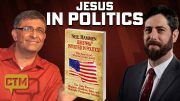Despite decades of taxpayer subsidies to preach the theory of evolution in government schools, a recent Gallup survey showed that slightly more Americans believe the biblical account of creation today than 30 years ago when polls on the subject first began. Just 15 percent of respondents thought godless evolution explained the origin of man.
About 46 percent of those polled said they believed in what is known as creationism — that God created humans in their present form at one time within the last 10,000 years or so. In other words, almost half of Americans support a literal interpretation of the Bible’s book of Genesis, which says that the Creator made Adam and Eve after creating the Earth in six days.
When the question was first asked by Gallup in 1982, around 44 percent of Americans held that view. In the last three decades — despite overwhelming emphasis on teaching the theory of evolution in government schools — the number has held fairly constant, bouncing back and forth between 47 and 40 percent.
Meanwhile, around a third of those surveyed said they believed that — with God’s guidance — humans had developed over millions of years, down six percent from 30 years ago. The prevalence of that view, sometimes known as “theistic evolution” or “evolutionary creation,” reached a new low in 2012 among Americans.
Only 15 percent of those surveyed thought man had evolved from less advanced life forms without any divine intervention. But while still deeply in the minority, that figure has been rising fairly steadily — up from nine percent in 1982. Last year, 16 percent of respondents said they believed the theory.
About seven percent of those surveyed said they either had no opinion or believed in something else, Gallup reported. But overall, eight out of 10 Americans still believe God was ultimately responsible for the existence of man — probably more.
“All in all, there is no evidence in this trend of a substantial movement toward a secular viewpoint on human origins,” concluded Gallup’s editor-in-chief Frank Newport in a statement announcing the survey results.
Unsurprisingly, people who attend church weekly were far more likely to hold biblical creationist beliefs — about two thirds, according to Gallup. Even among those who rarely or never attend church, however, just one fourth believed in godless evolution, with another quarter believing in creation.
The survey results also showed that more Republicans than Democrats believe in creationism, though even Democrats, at 41 percent, were more likely to be creationists than either of the other options. Just five percent of self-identified GOP supporters believed in evolution without God, while slightly less than one in five Democrats did.
Only Americans with postgraduate education were less likely to believe in creation, with 42 percent choosing God-guided evolution and 25 percent believing in creationism. Among college graduates, almost half were creationists while just 14 percent thought evolution without God explained human origins. Overall, higher levels of education tended to coincide with lower levels of support for creationism.
“Since ‘belief’ in evolution coincides with higher degrees of education according to the poll, evolution adherents would interpret the data as indicating that less educated people don’t believe in evolution,” observed Christine Dao with the Institute for Creation Research, an organization that defends the scientific accuracy of the literal understanding of the Bible.
“However, this interpretation doesn’t acknowledge that evolution is the only origins theory taught in most taxpayer-funded school systems,” Dao continued. “If students are getting only one side of the story and have to accept that one side to make the grade, guess what they’re going to grow up to believe?”
A 2007 Gallup poll that was phrased and conducted differently, however, found much stronger support for the creationist viewpoint. In that survey, USA Today reported that about two thirds of respondents — 66 percent — said they thought God created humans in one day within the last 10,000 years.
The most recent USA Today/Gallup poll, released on June 1, was based on interviews with a random sample of more than 1,000 adults living throughout America. According to the pollsters, there is 95 percent confidence that the maximum margin of error is four percentage points.
“Despite the many changes that have taken place in American society and culture over the past 30 years, including new discoveries in biological and social science, there has been virtually no sustained change in Americans’ views of the origin of the human species since 1982,” stated Gallup’s Newport about the findings.
But the debate over evolution versus creation is not raging just in America. According to a report released on June 5 by the journal Nature, education officials in South Korea recently surrendered to public demands and agreed to remove certain controversial pieces of alleged evidence dealing with evolution from textbooks.
Apparently, however, proponents of the theory are set to begin a campaign in the nation to drum up support for evolution while countering skepticism and creationism. Creationists, on the other hand — led by the Society for Textbook Revise — are hoping to delete the “error” of evolution from school textbooks altogether.
Related articles:
“The Mysterious Islands” Challenges Darwin
Demythologizing Darwin—A Review of Wiker’s “The Darwin Myth”
Intelligent Design and Evolution
Teacher Fired for Critical View of Evolution
Texas School Board Debates Adding Books With Alternatives to Evolution
Illustration: The Creation of Adam, Michelangelo




